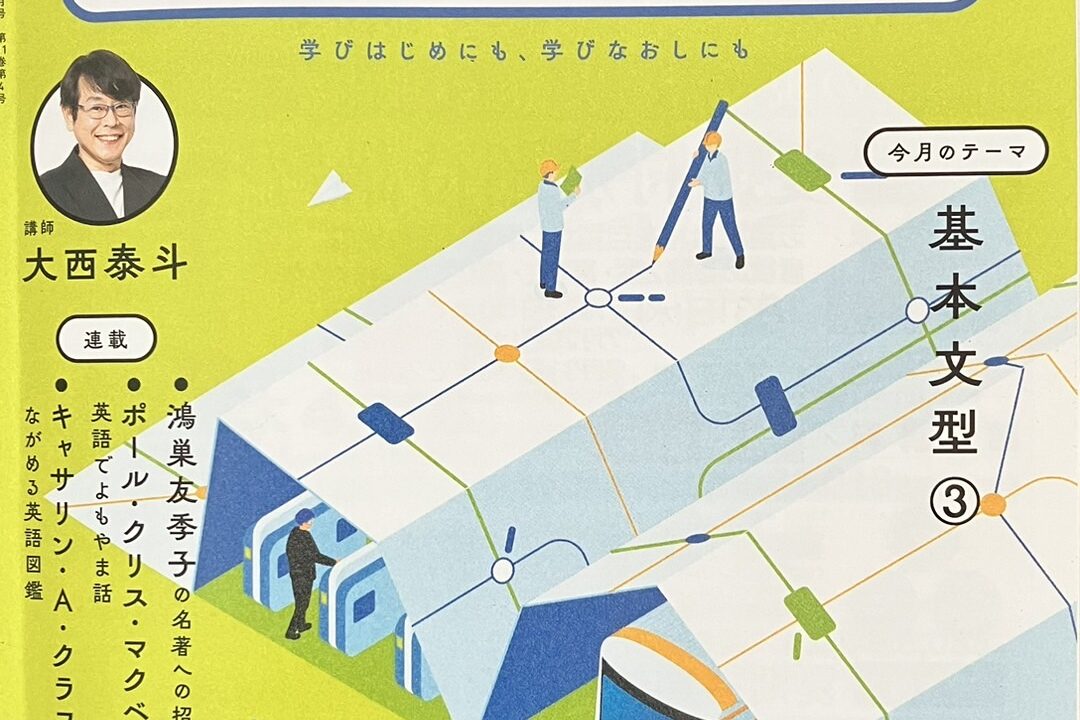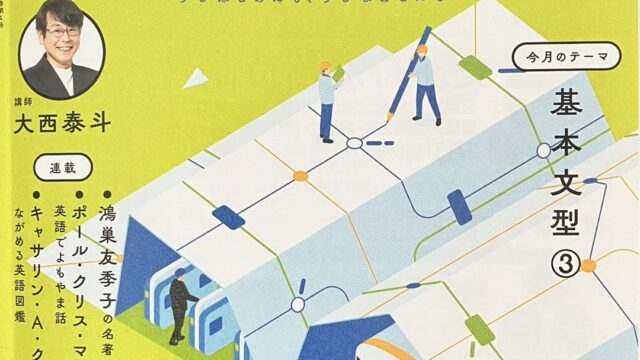【ラジオ英会話】Lesson 64 リポート文(that)節 – July 4 Thursday, 2024

July 4 Thursday, 2024
Lesson 64 リポート文(that)節
☆Words & Phrases
Hi, Helen, how are you doing these days?
**not anymore:
Hi, Gary. Fine. It’s hard to believe that we’re not in school anymore.
**look for ~:
Yeah, I’m still looking for a job.
They gave me a new one.
**odds:
What were the odds, right? One in ten thousand?
**Lucky you.:
☆Grammar and Vocabulary
It’s hard to believe that we’re not in school anymore.
it ~ to… の形
it は this や that のように「指す」表現ではなく「受ける」単語
この文では、心に浮かんだ情景を it で「受け」て、「難しいんだよ」と文を始めている
そのままでは何が難しいのかわからないため、to以下で「私たちがもう在学中ではないことを信じるのは、ね」と展開している
Did you get your phone fixed?
目的語説明型(SVOC)
この文は、
your phone が fixed(直された)という状況 を get しましたか?
ただ、理解できることと自分で作り出せることは別問題。しっかりと音読・暗唱を重ね、こうした文を瞬時に作ることができるようにしてください!

☆Target Forms
I’m sure you’ll find something soon.
この文は「リポート文」
主語の思考・発言・知識などを「リポート」する
この形には、英語の2大語順則のひとつ「説明ルール: 説明は後ろに置く」が働いており、動詞(句)の内容を後続の節(文の部品として使われる、主語・動詞を備えた「小さな文」のこと)が説明している
この文では be動詞を中心とした 動詞句 am sure(確信している)の内容を you’ll 以下 の節が説明している
I’m sure that ~ と、節の前 に that を置くことがしばしばある。この形は、「(that)節」と呼ばれることもある
Practice
リポート文が日本人にとってやっかいなのは、語順が反転することです。英語では am sure とまず述べ、節が後ろに展開しますが、日本語は「~だと確信している」となってしまいます。英語の語順をしっかり意識しながら練習することが肝心ですよ。
I‘m sure
↓
I‘m sure you’ll find something soon.
① I think he’s a good guy.
I believe he’s a good guy.
I know he’s a good guy.
→ 動詞 think(思う)、believe(信じている)、know(知っている)を先に出し、その説明として節を展開
② He told me ~.
He promised me ~.
He text-messaged me ~.
→ 動詞句には2語以上のカタマリが使われることもある
③ I’m afraid that he’s lying.
I’m positive that he’s lying.
I’m aware that he’s lying.
→「be動詞+形容詞」で動詞句を作る、キーセンテンスと同じ形
節の前の that は「導く」ニュアンス。「私が思っているのはどういうことかというと~」と、動詞句の内容をしっかりと正確に説明につなげる。カチッとした発言ではよく使われる形
★Practice
D: All right everyone. It’s time for today’s practice. Yes, that’s right「リポート文」So remember, in English, that clauses come at the end. We’ll use the main verb first, and then put at that clause after. So focus on the order, and let’s practice.
R: Let’s begin!
– I think
– I think he’s a good guy.
– I believe
– I believe he’s a good guy.
– I know
– I know he’s a good guy.
D: Great work so far. Keep it up,
– He told me ~.
– He promised me ~.
– He text-messaged me ~.
R: Keep going,
– I’m afraid
– I’m afraid that he’s lying.
– I’m positive
– I’m positive that he’s lying.
– I’m aware
– I’m aware that he’s lying.
D: Unlock your potential.
R: Repetition is the key!
D&R: Great work.
☆Grammar in Action
①あなたはその仕事をきっと手に入れますよ。あなたは十二分に資格があります
**more than ~:
**more than qualified:
②それはいいアイデアだと思います。私たちはちょっとやってみるべきですよ
**give it a try:
③彼女が私に、彼女は来ないとメールしてきました。何かが起こったみたいです
**come up:
★Ending
D: Ah~, Sensei. Roza text-messaged me that she isn’t coming.
O: Hum, you know why?
D: Why is that?
O: She is in show business.
R: There is no business like show business.
July 4 Thursday, 2024
Lesson 64 リポート文(that)節
(日本語訳・解説付き)
☆Words & Phrases
Hi, Helen, how are you doing these days?
やあ、ヘレン、最近はどんな調子だい?
※「最近」というと、recently が思い浮かぶかもしれませんが recently は「つい最近、この前」で、ちょっと前の過去に起きたこと、過去のある時点のことを指します。そのため「過去形」や「現在完了形」で使います!these days は「前と違って最近は~」で、現在のことです。なので「現在形」で使います
**not anymore: もはや〜ではない
Hi, Gary. Fine. It’s hard to believe that we’re not in school anymore.
こんにちは、ギャリー。元気よ。私たちがもう学生じゃないなんて信じられないわ
**look for ~: ~を探す
Yeah, I’m still looking for a job.
うん、僕はまだ職探しをしているし
※ look は「目をやる」、for は「求める」なので、look for は「求めて目をやる=探す」となります!
They gave me a new one.
彼らは、私に、新しいのをくれました=新品のものを渡してくれたよ
※「私に、新しいのを」で、授与型(SVOO)の文です!
**odds:(物事が起こる)確率
What were the odds, right? One in ten thousand?
その確率はどれくらいだったのか、ということだよね?1万分の1かな?
**Lucky you.: ついてるね。/よかったね。
※ここでの「ついてるね」は、わずかな確率の「ハズレ」の携帯電話に当たってしまったことを少し皮肉って言っています
☆Grammar and Vocabulary
It’s hard to believe that we’re not in school anymore.
私たちがもう在学中ではないことを信じるのは難しいです
it ~ to… の形
it は this や that のように「指す」表現ではなく「受ける」単語
この文では、心に浮かんだ情景を it で「受け」て、「難しいんだよ」と文を始めている
そのままでは何が難しいのかわからないため、to以下で「私たちがもう在学中ではないことを信じるのは、ね」と展開している
Did you get your phone fixed?
あなたは電話を修理してもらいましたか?
目的語説明型(SVOC)
この文は、
your phone が fixed(直された)という状況 を get しましたか?
ただ、理解できることと自分で作り出せることは別問題。しっかりと音読・暗唱を重ね、こうした文を瞬時に作ることができるようにしてください!

☆Target Forms
I’m sure you’ll find something soon.
私は、あなたがすぐに何か見つけると確信しています
この文は「リポート文」
主語の思考・発言・知識などを「リポート」する
この形には、英語の2大語順則のひとつ「説明ルール: 説明は後ろに置く」が働いており、動詞(句)の内容を後続の節(文の部品として使われる、主語・動詞を備えた「小さな文」のこと)が説明している
この文では be動詞を中心とした 動詞句 am sure(確信している)の内容を you’ll 以下 の節が説明している
I’m sure that ~ と、節の前 に that を置くことがしばしばある。この形は、「(that)節」と呼ばれることもある
Practice
リポート文が日本人にとってやっかいなのは、語順が反転することです。英語では am sure とまず述べ、節が後ろに展開しますが、日本語は「~だと確信している」となってしまいます。英語の語順をしっかり意識しながら練習することが肝心ですよ。
I‘m sure
↓
I‘m sure you’ll find something soon.
① I think he’s a good guy.
私は、彼はいい人だと思います
I believe he’s a good guy.
私は、彼はいい人だと信じています
I know he’s a good guy.
私は、彼はいい人だと知っています
→ 動詞 think(思う)、believe(信じている)、know(知っている)を先に出し、その説明として節を展開
② He told me ~.
彼は、~だと私に教えてくれました
He promised me ~.
彼は、~だと私に約束してくれました
He text-messaged me ~.
彼は、~だと私にメールをくれました
→ 動詞句には2語以上のカタマリが使われることもある
③ I’m afraid that he’s lying.
私は、彼がうそをついていると思っています(恐れています)
I’m positive that he’s lying.
私は、彼がうそをついていると確信しています
I’m aware that he’s lying.
私は、彼がうそをついていると気がついています
→「be動詞+形容詞」で動詞句を作る、キーセンテンスと同じ形
節の前の that は「導く」ニュアンス。「私が思っているのはどういうことかというと~」と、動詞句の内容をしっかりと正確に説明につなげる。カチッとした発言ではよく使われる形
★Practice
D: All right everyone. It’s time for today’s practice. Yes, that’s right「リポート文」So remember, in English, that clauses come at the end. We’ll use the main verb first, and then put at that clause after. So focus on the order, and let’s practice.
R: Let’s begin!
– I think
– I think he’s a good guy.
– I believe
– I believe he’s a good guy.
– I know
– I know he’s a good guy.
D: Great work so far. Keep it up,
– He told me ~.
– He promised me ~.
– He text-messaged me ~.
R: Keep going,
– I’m afraid
– I’m afraid that he’s lying.
– I’m positive
– I’m positive that he’s lying.
– I’m aware
– I’m aware that he’s lying.
D: Unlock your potential.
R: Repetition is the key!
D&R: Great work.
☆Grammar in Action
①あなたはその仕事をきっと手に入れますよ。あなたは十二分に資格があります
I’m sure that you’ll get the job. You’re more than qualified.
**more than ~: ~を超えて
**more than qualified: 十二分に資格がある
②それはいいアイデアだと思います。私たちはちょっとやってみるべきですよ
I think it’s a good idea. We should give it a try.
**give it a try: ちょっとやってみる
③彼女が私に、彼女は来ないとメールしてきました。何かが起こったみたいです
She text-messaged me that she isn’t coming. Something came up, I guess.
**come up:(問題・困難などが)起こる
★Ending
D: Ah~, Sensei. Roza text-messaged me that she isn’t coming.
O: Hum, you know why?
D: Why is that?
O: She is in show business.
R: There is no business like show business.
『ショウほど素敵な商売はない』
名古屋駅前にあるビジネス英語&仕事での英語雑談力をつけるための「名古屋BEGビジネス英会話ジム」
営業時間:平日 9:00~22:00 土曜日 9:00~19:00(日祝休み)
〒450-0002 愛知県名古屋市中村区名駅2丁目40-16 名駅野村ビル 5階


